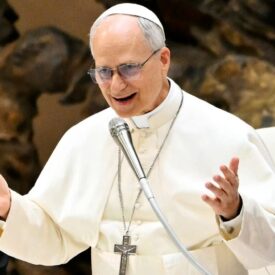In his first writing as Holy Father, Pope Leo XIV has offered the Church a profound meditation on the love of Christ for the poor. The Apostolic Exhortation Dilexi Te (“I Have Loved You”) continues a reflection that began under Pope Francis, completed and deepened by Pope Leo with his own pastoral heart and voice.
A Work Born of Continuity and Compassion
When Pope Francis began preparing this exhortation before his passing, his intent was to renew the Church’s understanding of God’s particular love for the poor and suffering. Pope Leo XIV, honoring that intention, took up the work and brought it to completion, weaving in his own spiritual vision of faith, hope, and love in a time of division and violence.
At its core, Dilexi Te reminds us that Christ’s love is not abstract. It is expressed in solidarity in His identification with “the least of these” (Mt 25:40) and in His summons that we, too, learn to love as He loves.
“Love for the Lord, then, is one with love for the poor. The same Jesus who tells us, ‘The poor you will always have with you’ (Mt 26:11), also promises the disciples: ‘I am with you always’ (Mt 28:20). We likewise think of his saying: ‘Just as you did it to one of the least of these brothers and sisters of mine, you did it to me’ (Mt 25:40). This is not a matter of mere human kindness but a revelation: contact with those who are lowly and powerless is a fundamental way of encountering the Lord of history. In the poor, he continues to speak to us.” — Pope Leo XIV, Dilexi Te
The Heart of Dilexi Te
Pope Leo’s apostolic exhortation calls all Christians to rediscover the inseparable bond between love for God and love for the poor. Across five chapters, the Holy Father leads us through Scripture, tradition, and Church history to show that compassion for the poor and suffering has always been at the heart of Christian holiness.
Some key themes include:
- The Cry of the Poor: God hears the suffering of His people and sends His followers as instruments of mercy and liberation (Ex 3:7–10).
- God’s Preferential Love: From Israel to the life of Christ, God reveals a “preferential option” for the poor, not as exclusion, but as a revelation of divine love.
- A Church for the Poor: Pope Leo calls the Church to be “poor and for the poor,” echoing Saint Lawrence’s words: “These are the treasures of the Church.”
- Witnesses of Charity: From Saint Francis of Assisi to Saint Teresa of Calcutta, the document recalls how saints have lived the Gospel through concrete acts of love.
- A Constant Challenge: The Holy Father warns against indifference, urging believers to “see Christ in the faces of those who suffer” and to act with generosity and justice.
A Gospel Vision for Our Time
In Dilexi Te, Pope Leo XIV continues the evangelical mission championed by Pope Francis — one that embraces the poor, heals division, and restores dignity to every person. This exhortation is not merely a social document; it is a spiritual invitation to conversion. Each of us is called to hear the cry of the poor in our own communities, to respond with compassion, and to encounter Christ anew through mercy.
“Love for the poor is an essential element of the history of God’s dealings with us; it rises up from the heart of the Church as a constant appeal to the hearts of the faithful, both individually and in our communities.” — Pope Leo XIV, Dilexi Te
A Call to Read and Reflect
Pope Leo’s first writing, Dilexi Te, offers a blueprint for a Church renewed in tenderness and truth. It invites us to enter deeply into Christ’s love, a love that bends low, heals wounds, and restores hope.
We encourage you to read the full text of this moving Apostolic Exhortation on the Vatican website and make it part of your own spiritual reading and prayer.


